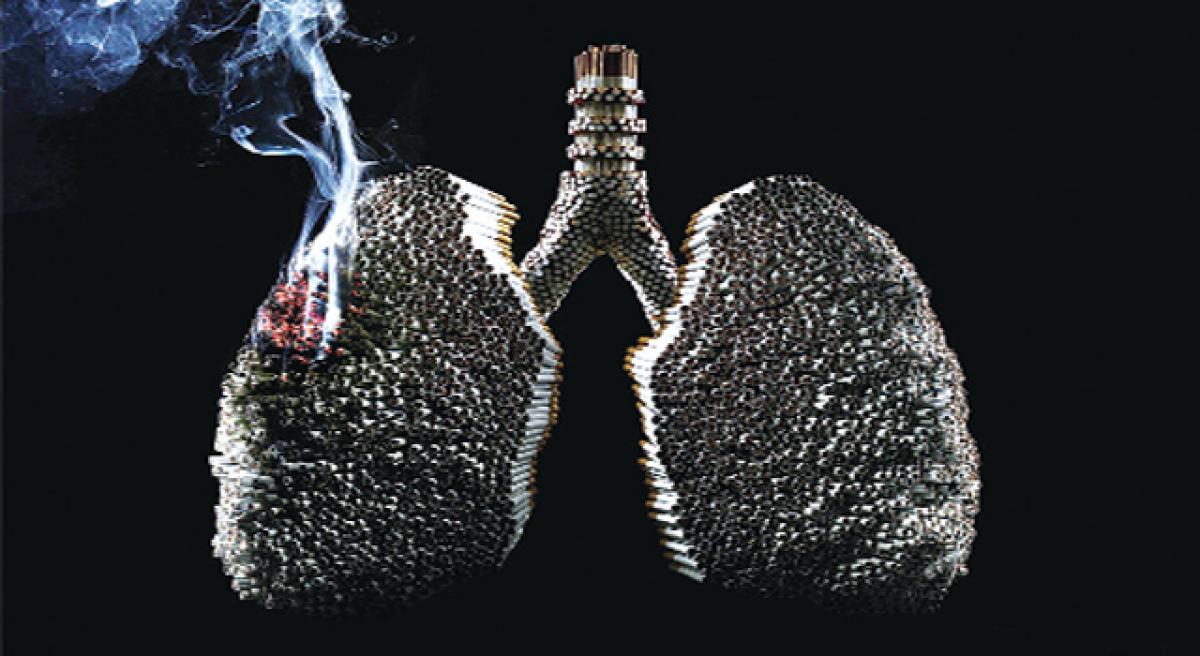Just In

Successful and well-settled, 46-year-old IT professional Surya had achieved more in life than he had envisioned. All set to take a giant leap in his career.
Successful and well-settled, 46-year-old IT professional Surya had achieved more in life than he had envisioned. All set to take a giant leap in his career.
A random CT scan at the lung cancer awareness camp organised at office turned his life upside down. An active smoker from his college days, Surya was diagnosed with Lung Cancer.
For almost half of his life, Surya’s lungs had been exposed to carcinogenic cigarette smoke. Fortunately for Surya, his cancer had not reached an advanced stage and could be treated.
Lung cancer was once considered a rare type of cancer, but not anymore. If you are above the age of 45 years and have been an active smoker for the last 20 years, then you must get yourself screened for lung cancer on a yearly basis.
Cigarette smoking increases a person’s chance of getting lung cancer by 15 to 30 times. Unfortunately, in India lung cancer is most often misdiagnosed as tuberculosis, which makes timely treatment even more challenging It is also important to realise that lung cancer does not spare anyone and we have found lung cancer in very young smokers too, re-emphasising the importance of screening in high risk groups.
Surya is not alone. There are millions of people who are hooked to smoking without giving a single thought to its consequences. Lung cancer is the most common cause of death due to cancer in both men and women throughout the world with 1.6 million deaths.
According to GOLOBOCAN in India,76599 new cases of lung cancer were reported in 2015, which is projected to rise to 88,831new cases annually by the year 2020. In India, 87 per cent of male and 85 per cent of female patients with lung cancer have a history of active tobacco smoking.
While smoking is known to be a major risk factor for lung cancer, other risk factors may include exposure to carcinogenic chemicals, passive smoking, air pollution, lung infections, burning of coal in houses, and family history. Therefore, even if you are not a smoker, you should get screened for lung cancer for you own good and happiness of your family members.
Symptoms of lung cancer include cough, coughing up blood or rusty-coloured phlegm, fatigue, unexplained weight loss, recurrent respiratory infections, hoarseness, new wheezing, and shortness of breath. Prolonged cough lasting more than 3 weeks, especially in smokers, needs immediate screening.
According to experts, lung cancer does not discriminate between the rich and the poor and it can strike anyone at any time.
Of late, several public health programs focusing on heart disease and its prevention have been initiated in the country. There is an urgent need to put the spotlight on lung cancer, the risk factors involved, and prevention and treatment options available, since lungs are as vital as the heart and other organs.
Unfortunately, most of the patients come for treatment at a very advanced and critical stage of lung cancer. Lung cancer does not exhibit any symptoms in the initial stages.
This is why early screening and diagnosis is extremely important to thwart disease progression. Lung cancer when diagnosed in advanced stages, most often turns fatal as it spreads rapidly. Screening has been the only way till now which reduces the mortality from lung cancer.
Lung cancer can be diagnosed with a routine CT scan, X-ray of the chest cavity or sputum cytology. Of these, only low-dose spiral/helical CT scan have been recommended for lung cancer screening among high-risk patients. Early diagnosis is very critical to successful treatment of lung cancer. As far as treatment goes, lung cancer, if diagnosed at an early stage can be cured by surgery.
“Surgery, be it the traditional open technique or more recentlyminimally invasive (MIS) techniques includingthoracoscopic or robotic techniques, is the most important treatment option in curing lung cancer.
However, newer methods like minimally invasive technique have been emerged as the game changers as they are less painful and patients can go to work early.
In addition, advances in radiation therapy and discovery of several newer molecules chemotherapeutic and targeted drugs have significantly improved survival outcomes of lung cancer patients,” says Dr K V V N Raju, Surgical oncologist at BasavaTarakam Indo American Cancer Institute, Banjarahills, Hyderabad.
Innovative instrumentation such as titanium staplers are used to facilitate these surgeries. In this technique, special type of surgical staplers made up of Titanium is used to remove tumour from the lung.
This procedure decreases the overall cost of surgery by reducing hospital stay and rate of complications. Advanced technological innovations have made the surgery much safer than earlier, as they are performed by making small holes rather than a large incision in the chest.
So, with such advanced diagnostic and treatment options available at hand, get yourself and your loved ones screened for lung cancer now, before it is too late and stop your life from slipping away from your hands.

© 2024 Hyderabad Media House Limited/The Hans India. All rights reserved. Powered by hocalwire.com







